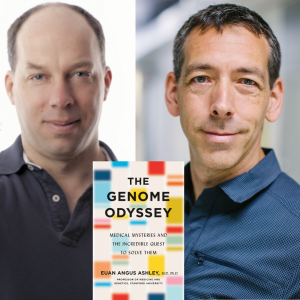
Friday Jun 18, 2021
#150 Euan Ashley and Stephen Quake on The Genome Odyssey
This marks the 150th episode of DNA Today! Our guests to celebrate this landmark episode of DNA Today are Dr. Euan Ashley, a medical geneticist and cardiologist. And Dr. Stephen Quake, a physics professor, bioengineer and pioneer in microfluidics.
A Scotland native, Dr. Euan Ashley graduated with degrees in Physiology and Medicine from the University of Glasgow. He completed medical residency and a PhD in molecular physiology at the University of Oxford before moving to Stanford University where he trained in cardiology and advanced heart failure, joining the faculty in 2006. In 2010, he led the team that carried out the first clinical interpretation of a human genome. The paper published in the Lancet was the focus of over 300 news stories, and became one of the most cited articles in clinical medicine that year. The team extended the approach in 2011 to a family of four and now routinely applies genome sequencing to the diagnosis of patients at Stanford hospital where Dr. Ashley directs the Clinical Genome Service and the Center for Inherited Cardiovascular Disease. In 2014, Dr Ashley became co-chair of the steering committee of the NIH Undiagnosed Diseases Network.
Stephen Quake is a professor of bioengineering and applied physics at Stanford University and is co-President of the Chan Zuckerberg Biohub. He holds a B.S. in Physics and M.S. in Mathematics from Stanford University and a doctorate in Theoretical Physics from the University of Oxford. Dr. Quake has invented many measurement tools for biology, including new DNA sequencing technologies that have enabled rapid analysis of the human genome and microfluidic automation that allows scientists to efficiently isolate individual cells and decipher their genetic code. Dr. Quake is also well known for inventing new diagnostic tools, including the first non-invasive prenatal test for Down syndrome and other aneuploidies. His test is rapidly replacing risky invasive approaches such as amniocentesis, and millions of women each year now benefit from this approach. He was also the fifth person in the world to have their genome sequences and his genome was the subject of clinical annotation by a large team at Stanford Hospital led by Dr. Ashley.
On This Episode We Discuss:
The first clinical interpretation of a human genome
Genome sequencing technologies
The cost of sequencing a genome
Understanding the genomic code
The future of precision medicine
Dr. Ashley’s book, The Genome Odyssey
Want to read the Genome Odyssey? Enter to win your own copy! Head over to our Twitter, Instagram, Facebook, and LinkedIn to enter to win a free book!
Be sure to follow Dr. Ashley and Dr. Quake on Twitter!
How do you keep research articles organized? We have struggled with this for years, but have finally found a solution that is simple and easy. It’s called Paperpile! It radically simplifies the workflow of collecting, managing and writing papers. Paperpile allows you to highlight and annotate papers, manage references, share and collaborate and even cite directly in Google Docs and Microsoft Word. Paperpile’s new mobile apps allows you to sync your library to all your devices so you can read and annotate on your iPad, iPhone, or Android device. Start your free 30 day trial today at paperpile.com with promo code “DNATODAY”. Paperpile costs only $36 per year, but with code “DNATODAY” you save 20%!
Want to become a genetic counselor? Looking for ways to engage with the field and boost your resume for grad school applications? Then you should check out Sarah Lawrence’s “Why Genetic Counseling Wednesday Summer Series”! Every Wednesday this June Sarah Lawrence is hosting this series where you can interact through Zoom with genetic counselors from different specialties for an hour and a half. You can sign up at SLC.edu/DNAtoday to register to level up your resume for applications in the fall.
Stay tuned for the next new episode of DNA Today on July 2nd, 2021! We’ll be joined by Dr. Richard Michelmore and Dr. Brad Pollock who will be discussing COVID-19 variants. New episodes are released on the first and third Friday of the month. In the meantime, you can binge over 150 other episodes on Apple Podcasts, Spotify, streaming on the website, or any other podcast player by searching, “DNA Today”. All episodes in 2021 are also recorded with video which you can watch on our YouTube channel.
See what else we are up to on Twitter, Instagram, Facebook, YouTube and our website, DNApodcast.com. Questions/inquiries can be sent to info@DNApodcast.com.
No comments yet. Be the first to say something!